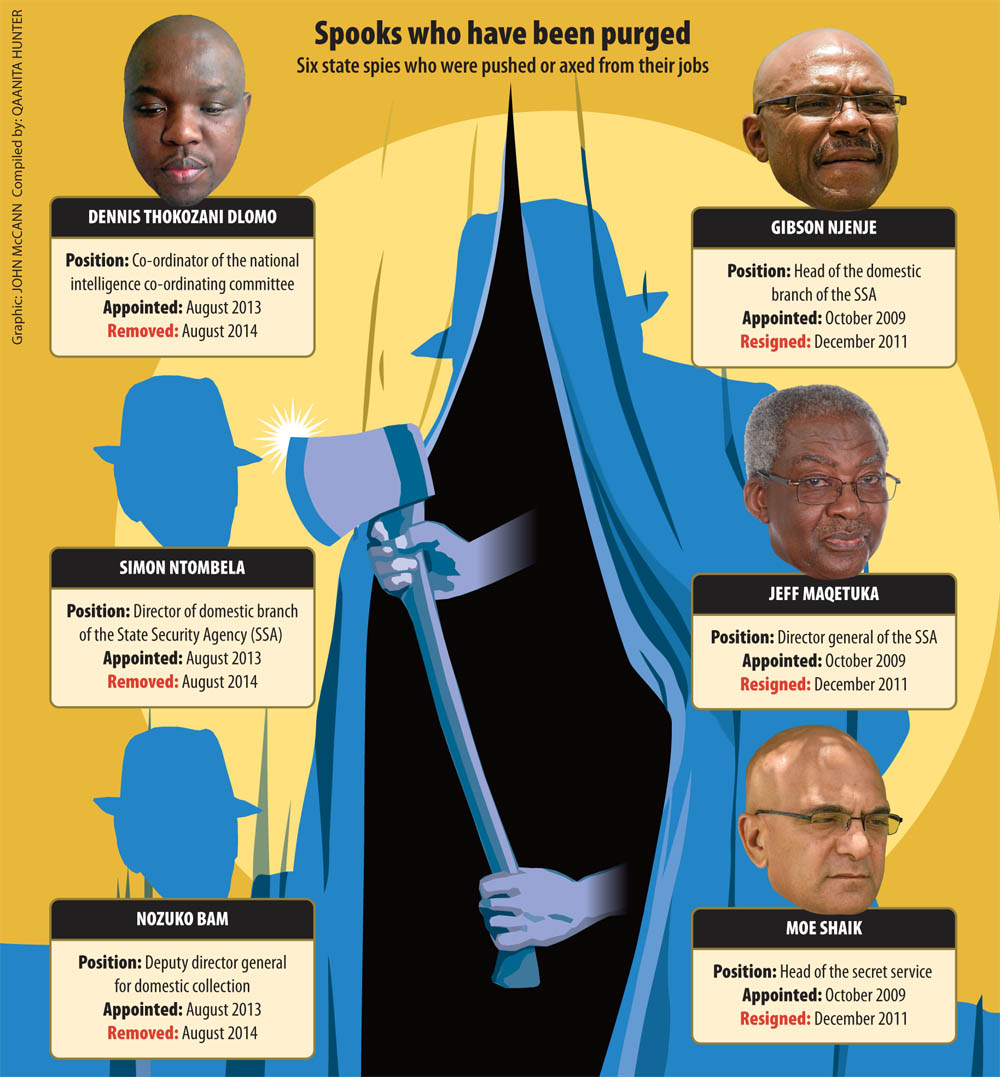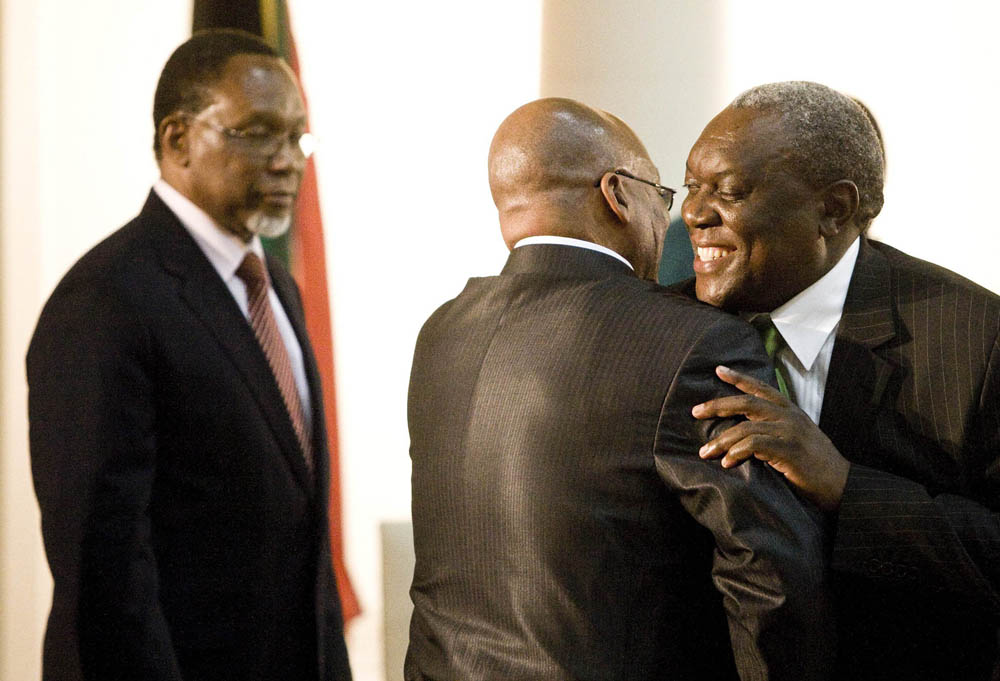David Mahlobo was sworn in as minister of state security this year.
NEWS ANALYSIS
Barely three years after a massive purge of senior intelligence managers, three more top spies have been removed.
This is the latest example of political meddling in the state security agencies by the ANC and President Jacob Zuma, who seems increasingly mistrustful of his top spooks.
This brings to six the number of senior intelligence leaders, once perceived to be loyal to Zuma, who have been removed in five years during his administration. It raises serious questions about the stability of the country’s key security institution and the consequences of the president’s mistrust.
State Security Minister David Mahlobo confirmed on Wednesday that head of the national intelligence co-ordinating committee Dennis Dlomo, director of the domestic branch of the State Security Agency Simon Jabulani Ntombela and deputy director general of domestic collection Nozuko Bam have been “redeployed” to the department of international relations and co-operation.
They were appointed barely a year ago, and Dlomo was also acting director general of state security at one stage.
The three senior spies are currently undergoing diplomatic training.
“Government took a collective decision that they must be sent … as ambassadors,” Mahlobo said in an interview this week.
Too loyal to Cwele
The Mail & Guardian spoke to six sources – a senior public servant, a member of the ANC’s national executive, three senior officials close to the intelligence services and an ANC leader in the peace and security subcommittee of the party’s national executive committee.
The main reason for removing the senior state security officials is said to be Zuma’s concern that they are too loyal to the former state security minister, Siyabonga Cwele.
Although Cwele, now the minister of telecommunications, was one of Zuma’s trusted lieutenants during his first term as president, Zuma seems to have lost faith in him.
But Mahlobo denied that he was purging his predecessor’s loyalists, insisting it was a party decision – even though they were employed as public servants.
“There is nothing untoward. Remember, we have the right to get rid of people. That is the right we have. This is how the ANC works,” Mahlobo added.
All three initially resisted the foreign postings, citing logistical reasons.
“I met with all three of them several times. There were some concerns about going overseas with kids … but they will be better off.”
After several meetings, compromises were reached.
That they were informed of their impending move “by comrades” rather than through the official channels of the State Security Agency (SSA) or even the minister apparently added to their dissatisfaction.
‘Administrative error’
Mahlobo said this was a “small administrative error”, which could not be conflated with other concerns.
He claimed that they were politically appointed and were being redeployed by the ANC.

The ANC leader the M&G spoke to confirmed that the decision to purge them was taken by the party’s subcommittee on peace and stability “because we want to stabilise our intelligence services”.
Mahlobo sits on the committee.
The Public Service Commission has persistently raised concerns about the politicisation of the public service, and the National Planning Commission has also said that the public service should be professionalised.
Complaints
The ANC leader said there had been complaints about the three officials and the party had given Mahlobo the go-ahead to get rid of them.
“He [Mahlobo] will have to act. We are aware that they are telling comrades that the minister doesn’t like them, but this is not the truth. These agencies are crucial to our stability as a country and we cannot compromise them because of their egos.
“There was a complaint against Ntombela from members of his staff. [Another official] went on world trips without telling the minister. What do you call that? Insubordination, if you ask me,” said the ANC leader.
A former intelligence official who worked in the ministry during Cwele’s reign said on Thursday that, although Ntombela was “an old crock who has been in the service for a long time and posted to several stations”, he had also played the factional game.
“He came in the same way he was chucked out … He was promoted when people like Moe [Shaik] were booted out. He played the game and now he’s feeling the brunt,” said the official, who was also given the boot.
“I have learned my lesson … pledging loyalty to mistrustful politicians doesn’t pay.”
Unavailable for comment
Ntombela could not be reached for comment. A woman who answered his phone said he was “in training” and asked that questions be sent to him.
Bam denied that there was any bad blood between her and the new minister. Dlomo and Cwele could not be reached.
Cwele’s spokesperson, Siya Qozo, said: “As you know, Minister Cwele is the minister of telecommunications and postal services. Kindly refer your question to the relevant department or ministry.”
The senior public servant and the member of the national executive said the president’s paranoia and discomfort over Cwele loyalists had played a role in the decision.
The member of the executive, who has an intimate knowledge of security issues, said the instruction to fire the three came directly from the president.
This was confirmed by the official close to intelligence services, who said on Tuesday: “Watch out for more casualties in other intelligence units. Doesn’t it remind you of [former president Thabo] Mbeki in his last term?”
He was referring to Mbeki’s and the former intelligence minister Ronnie Kasrils’s decision to fire former domestic intelligence agency boss Billy Masetlha and his two senior chiefs, Bob Mhlanga and Gibson Njenje. They were accused of being entangled in the ruling party’s factional power struggles between Mbeki and Zuma and were seen as being loyal to Zuma.
Illegal interception
The three were also accused of illegally intercepting the telecommunications of businessperson and former Mbeki ally Saki Macozoma.
In 2008 Zuma, who was party president after defeating Mbeki in the ANC leadership race a year earlier, was instrumental in pushing the then caretaker president, Kgalema Motlanthe (who replaced Mbeki after the party recalled him), to appoint Zuma loyalists in the security cluster.
They included Cwele as intelligence minister, which was confirmed by Zuma in 2009 after the ministry was renamed state security.

Siyabonga Cwele, being hugged by Jacob Zuma as Kgalema Motlanthe looks on, was minister of state security in 2009. (Theana Calitz, Gallo)
Zuma, through Cwele, brought back some of those who were fired by Mbeki, such as Njenje and Mhlanga. He also appointed his confidant, Moe Shaik, as head of the foreign branch of the intelligence agency and former home affairs director general Jeff Maqetuka as director general of the South African Secret Service.
But Njenje, Shaik and Maqetuka were told to go shortly after Cwele told Zuma that he did not want the intelligence services to be abused, saying rogue spies would not be tolerated.
The three were said to have resisted political meddling in the intelligence operations, thus peeving Zuma and Cwele, before the party’s national elective conference in Mangaung.
Lost confidence
According to the public servants, Zuma suddenly lost confidence in Cwele and “he doesn’t trust anyone still loyal to [the minister]”.
The M&G reported before the April elections that Zuma would move Cwele from state security, along with the other security ministers, such as the former police and justice ministers, Nathi Mthethwa and Jeff Radebe, respectively.
But, the public servant said, Zuma could not remove Cwele from the Cabinet altogether “because he doesn’t want to create another [Julius] Malema who knows too much”. But Cwele surprisingly hired Zuma’s daughter, Thuthukile, as his liaison officer in state security and later promoted her to chief of staff in his telecommunications ministry.
According to sources, Zuma blamed Cwele’s and his loyalists’ incompetence for most of his scandals and blunders. He wants the new minister to clean up the mess, says the public servant.
To avoid Masetlha’s messy legal battles seven years ago and an ugly political spat, the Zuma administration has decided to look after the “redeployed” spies financially. Their salaries will not be reduced and they will earn handsome ambassadorial allowances.
Ambassadors
Mahlobo suggested that more intelligence officials will be sent abroad as ambassadors as they had “the right skills and training”. “We want our ambassadors to have the right training,” he said.
He denied that there is growing instability in the State Security Agency or that the removal of three senior managers will result in uncertainty in the organisation.
The agency will once again see acting officials at the helm of the organisation for a protracted period.
The member of the national executive said the positions are likely to be filled by Zuma loyalists. Naturally, the president will have the last say about who will head up the spy community.
Loyalists in security institutions
Zuma’s first term was characterised by an uncomfortable relationship with his erstwhile deputy Motlanthe, as well attempts to thwart his ambition to serve a second term as president of the party and the country.
There have also been a tough election, factional battles in the security institutions and shifts in loyalty by his alliance comrades, with the courts keeping a watchful eye over his administration.
This has prodded him to appoint loyalists in the security institutions – including the police, intelligence, prosecutions agencies and security ministries – to buttress his power and watch over his enemies.
The second term kicked off with more court battles, with opposition parties, especially the Economic Freedom Fighters of his comrade-turned-foe Julius Malema, giving him hell, his own failing health and the seismic vibration of another succession battle leading up to the party’s 2017 conference.
Zuma, the former party superspy, relies on “intelligence gathering” when under pressure, according to the ANC leader, and “he wants to keep control of this divided party”.
Zuma’s spokesperson, Mac Maharaj, had not responded to questions at the time of going to print.
Lack of trust
The M&G reported in April that former and current spies were contracted by the ANC to vet its prospective MPs, with some party leaders raising concerns that this could be used against them by a paranoid president.
Kasrils said the intelligence agencies had become the “football of the ANC leadership”. “When you have … paranoia, you won’t trust anyone. That is why you will have to get rid of people so soon after appointing them,” he said.
Kasrils appeared to take a dig at Mahlobo, calling him a “nobody” in the spy community and adding that there would be “natural resistance” to such a person. Yet Kasrils, under Mbeki, was also accused of using intelligence agencies for political ends and for purging the so-called Zuma loyalists.
David Maynier, the Democratic Alliance’s deputy state security spokesperson, raised concerns about the shake-up at the SSA.
“It’s a massive blow to the national intelligence structure to lose Dennis Dlomo as co-ordinator in the national intelligence co-ordination committee. He had huge experience as a former ministerial adviser and acting director general of the SSA.” – Additional reporting by M&G political staff